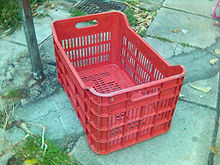Plastic box
The plastic boxes are reusable packaging for the transport and storage of certain products.
Manufacturers of plastic boxes and containers have two main markets: the fruit and vegetable sector and the industrial sector. Regarding the first, its customers are interested in the so-called Reusable Transport Containers (ERT), which are usually perforated (to help the product breathe) and stackable. Regarding the industrial sector, there are many types of plastic boxes on the market: with front opening, with lateral opening, with open handles, with closed handles, smooth walls and bottom, meshed walls and bottom, stackable, nestable, folding, etc... They are available in a large number of sizes. They are used as a means of storage or transport, both in internal circuits within the factory and externally between suppliers and customers from the most diverse industrial sectors.
Within plastic boxes for industrial use, two types of boxes should be highlighted due to their importance and specificity: European standard boxes and boxes with positioning and guidance systems in transport lines and automated warehouses.
The main advantages of the plastic box compared to other materials are lightness, resistance to impacts and the uniformity of measurements and dimensions. As drawbacks, the difficulties of complying with the demanding regulations on product labeling stand out. Said labeling must be done using a previously printed label that is usually fixed to the box by means of a label holder, given the difficulty of marking on the box itself.
European Standard Boxes
The most widely used polypropylene boxes for industrial use in the European market are those known as Europa Standard. The Europa Standard includes all those boxes whose measurements, taken in the upper frame, are submultiples of the standardized measurements of the European pallet, hence its name.
In this way, a defined number of Europa Standard boxes can be stacked, stored and/or transported on a European pallet, even combining different box sizes, without excess or lack of space on the pallet itself, facilitating, ordering and ensuring the stacking of the boxes in the operation and optimizing the use of the pallets and, therefore, minimizing transport and storage costs.
Base measurements
- European pallet _____1200x800 mm
- Standard box Europe of_600x800 mm
- Standard box Europe of_600x400 mm
- Standard box Europe of_300x400 mm
- Standard box Europe of_300x200 mm
European standard plastic boxes and scheme on European pallet.
Pools of plastic boxes
These are companies that rent boxes and containers (mainly for the fruit and vegetable sector) and undertake to collect and clean the container once the contents arrive at their destination. The operation is as follows: a fee is charged for the use of the boxes delivered and a deposit for each box delivered. The rental usually includes the delivery of the empty containers in the place chosen by the client and their collection, once they have been emptied, at the point of sale, as well as the washing of the box. The box models offered are restricted to two base areas (60x40 and 30x40) and various heights in each one.
The system of Reusable Transport Packaging (ERT) pools began to be established in Europe at the beginning of the 90s, in response to the regulations on packaging that were coming into force in countries such as Germany. By volume and the length of their journeys, the undisputed client of the pools in Europe has been the fruit and vegetable sector.
At the beginning of 1997, some edge and measurement standards were agreed for the box models most used in fruit and vegetable transport, which facilitates the interapility of the containers. Regarding the environment, pools are characterized by promoting the use of multi-use containers, unlike cardboard and wood, which are theoretically intended for single use. On the other hand, the plastic that many boxes incorporate is not 100% recyclable and therefore pollutes more than cardboard or wood. Thus, many pools have opted for using polypropylene containers, a fully recoverable material.
These are some of the most important international groups: STECO INTERNATIONAL, EURO POOL SYSTEM, IFCO and CHEP. In recent years, this business has grown at great speed, being highly appreciated by distribution chains that value the standardization of measurements and its rigidity, which makes it easier to manage within the trade.
Contenido relacionado
Laguna Blanca National Park
Collembola
Gulf of california

